
marekuliasz/iStock/Getty Images
The brisling sardine is a member of the fish family "clupeidae," which includes herring, shads and sardines. In Norwegian, "brisling" refers to a herringlike fish. Brisling sardines are found in the North Atlantic Ocean and the Labrador Sea southward to South Carolina along the eastern coast of the United States. Serve these tiny fish as snacks, in sandwiches, in salads or on toast with cream cheese to give your body a nutrient boost.
Nutrition Basics
Brisling sardines, like all sardine varieties, are rich in nutrients. Each 3.75-ounce can -- packed in oil and drained, with bone in -- contains approximately 23 grams of protein, which is 46 percent of the daily value set by the U.S. Food and Drug Administration based on a 2,000-calorie-per-day diet. The same amount also provides approximately 11 grams of total fat, which is 17 percent of the DV; 131 milligrams of cholesterol, which is approximately 43 percent of the DV; 191 calories; and no carbohydrate, fiber or sugar. Calorie count varies depending on whether sardines are packed in water, oil, tomato sauce, mustard sauce or other ingredients.
Provides Vital Vitamins
Although vitamins are not sources of energy, they play a crucial role in your body's health. They're essential to functions such as cell production, tissue repair and metabolism. A 3.75-ounce can of drained, oil-packed sardines, with bone in, contains 8.22 micrograms of vitamin B-12, which is more than 100 percent of the DV, and 178 international units of vitamin D, which is 45 percent of the DV set by the FDA.
Supplies Healthy Minerals
Just like vitamins, small amounts of minerals are essential to the proper functioning of your body's processes. A 3.75-ounce of drained, oil-packed sardines, with bone in, provides 351 milligrams of calcium, which is 35 percent of the DV set by the FDA, and 451 milligrams of phosphorus, which is 45 percent of the DV. Calcium and phosphorus play an important role in building and protecting bones and teeth.
Rich in Omega-3 Fatty Acids
Omega-3 fatty acid, a type of polyunsaturated fatty acid, is linked to reduced risk of cardiovascular disease. Fish is low in saturated fat and high in omega-3 fatty acid, making sardines a heart-healthy choice. According to the University of Massachusetts Medical School, eating fish like sardines twice a week allows you to obtain the amount of omega-3s necessary to reduce the risk of heart disease.
Additional Nutritional Considerations
Mercury is a toxic metal that can be absorbed by fish. Mercury can hinder brain development in children and affect learning and memory function in adults. Some types of fish, such as shark, swordfish and king mackerel, may contain high mercury levels. Sardines, however, contain low levels of mercury, according to University of Michigan Health System. The American Heart Association recommends including sardines in your meal plan.
Related Articles
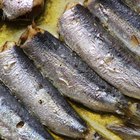
How to Cook Sardines in the Oven
How to Cook Atlantic Cod Fillets
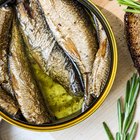
Chicken of the Sea Sardines Nutritional ...

How to Cook Rockfish Fillets

How to Bake Boneless Skinless Tilapia
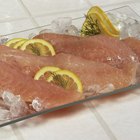
How to Brine Fish Before Cooking It

Nutritional Value of Dark Pumpernickel ...

How to Cook Trevally

How to Change the Battery in a Luminox ...
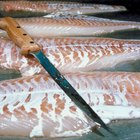
How to Grill a Cod Fish

How to Cook Salmon in Pineapple Juice

How to Replace the Battery in a ...
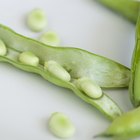
Nutritional Facts of Fava Beans

What Are the Health Benefits of Fresh ...

How to Get Rid of Skunk Smell With ...

How to Cook Tilapia With Orange Juice & ...

How to Grill and Smoke Swordfish
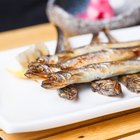
How to Cook Shishamo Fish

How to Clean Tilapia

Zinc & Copper for Aging Skin
References
- The Seafood Industry: Species, Products, Processing, and Safety; Linda Ankenman Granata, George J. Flick, Jr., Roy E. Martin
- Bottomfeeder: How to Eat Ethically in a World of Vanishing Seafood; Taras Grescoe
- USDA National Nutrient Database : Fish, Sardine, Atlantic, Canned in Oil, Drained Solids With Bone
- American Heart Association: Fish and Omega-3 Fatty Acids
- U.S. Food and Drug Administration: Guidance for Industry: A Food Labeling Guide
- University of Maryland Medical Center: Vitamins
- Aquarium of the Pacific: Seafood for the Future: Atlantic Herring
- University of Massachusetts Medical School: Preventing Heart and Vascular Disease: Omega-3 Fatty Acids
Resources
Writer Bio
Karen Curinga has been writing published articles since 2003 and is the author of multiple books. Her articles have appeared in "UTHeath," "Catalyst" and more. Curinga is a freelance writer and certified coach/consultant who has worked with hundreds of clients. She received a Bachelor of Science in psychology.
Photo Credits
marekuliasz/iStock/Getty Images